
In the lawn and landscaping business, everyone has to get their start somewhere. But for most companies, the goal is to grow in some form or fashion.
The fact is finding the right path to grow can feel daunting. Lawn and landscaping companies can level up and grow in so many ways. They can diversify their service offerings, add branches (regionally or even extending out-of-state), or even consider the franchise route.
The key is to make strategic decisions early on.
We spoke to several of the biggest lawn and landscaping companies in the country to find out what they feel contributed most significantly to their growth story and what advice they might have for others looking to take things to the next level.
Leveling Up: Learning as You Grow
Craig Ruppert, founder and CEO of Ruppert Landscape, which is headquartered in Laytonsville, Maryland, says that the start to his growth story is like that of many other landscape professionals. As one of eight kids, he needed to find ways to earn extra money to help pay for schooling or purchase “extras.” He and four of his siblings had paper routes, shoveled snow, and cut lawns. That ultimately grew into a business that saw many twists and turns — including selling the company in the late 90s, only to ultimately return to the industry in 2003.
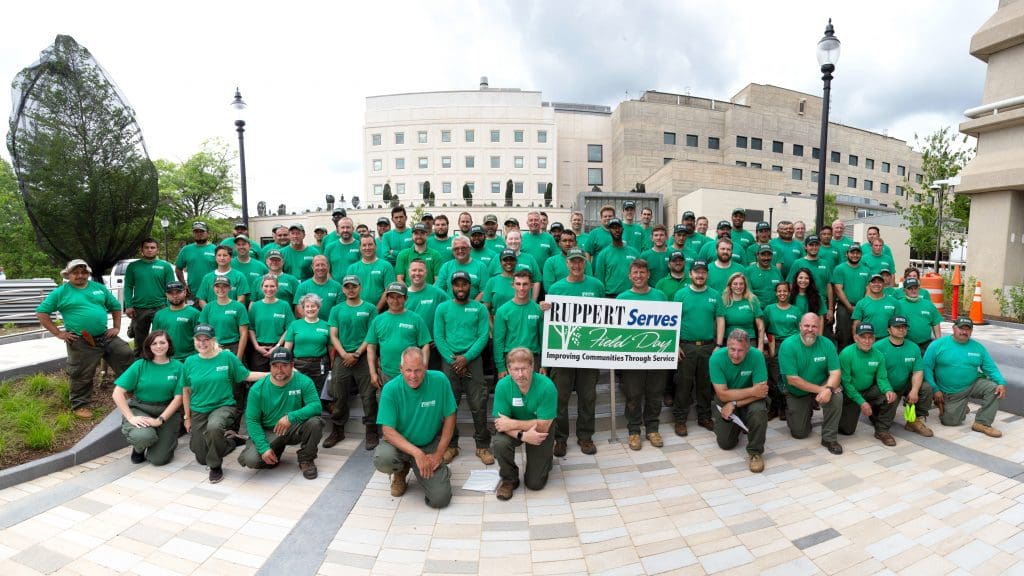
Today, Ruppert Landscape has around 1,800 employees and 29 branches.
Ruppert says he has learned so many growth lessons along the path. A big one has been to be receptive to learning from others.
“Watch and learn from your competition,” Ruppert advises. “Every competitor we have does something better than we do, and we can learn something from each of them. There are a lot of great companies out there that we’ve admired and learned from over the years — and frankly, are still learning from today.”
Being part of a network of industry professionals has also been instrumental in growth, says Ruppert.
“We discovered how important it was to seek advice and develop a network of people to rely on, including business and industry professionals, associations like NALP and ABC, and trusted advisors — all of which have enabled us to more clearly see our strengths and challenges and make more well-informed decisions as we grow,” he adds.
Ruppert says that every company must determine what rate of growth and what size fits them. Not all smaller companies have to become big to be successful.
“The market that you’re in will determine your growth to a degree,” adds Ruppert. “You have to have a market and a geography that will facilitate growth. Smaller markets tend to, for a lot of good reasons, have smaller companies. Larger companies require travel, and if you have a family, for example, you may not want to travel as much. It’s a choice you have to make.”
As far as diversification, Ruppert says they’ve remained focused on sticking to what they do best and not adding more service lines. They have remained focused on commercial landscape construction and landscape maintenance — and they subcontract specialty services within those broader categories.
“There are a lot of things that we don’t do, that we could do, but we choose to focus on our strengths and make sure we’re delivering a quality product,” Ruppert continues. “We tend to be conservative in everything we do, with a focus on steady growth and cautious spending.”
Leveling Up with Existing Clients: Growing into Maintenance
Juniper Landscaping, headquartered in Fort Meyers, Florida, is a great example of growth through diversification as well as the addition of branches to support that. The company got its start as a single branch doing around 85 percent installation work. But they leveled up by catering to existing clients who were looking for maintenance work. They used this model to grow from $3.5 million to $42 million between 2012 and 2016, with a goal to get to 50/50 maintenance and design/build.
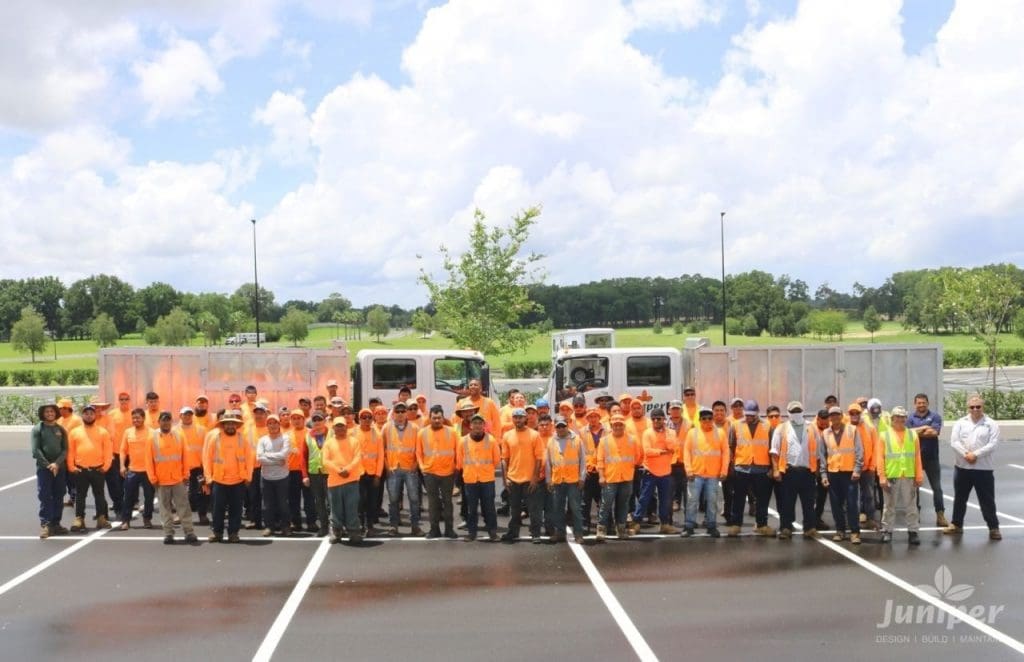
Dan DeMont, vice president of the company, says that a valuable growth lesson they learned on that journey was the importance of developing standard operating procedures (SOPs) and policies ahead of the growth.
“My best advice for any company looking to grow would be to develop those now,” DeMont urges. “It’s much harder to get them in place after you’ve grown. We still grew but I think it would have been a much more comfortable ride had we had those in place sooner.”
Today, Juniper Landscaping has 13 branches across Florida and is bringing in around $130 million in revenue.
DeMont says that when it comes to adding branches, you must do a cost-benefit analysis, looking at how much windshield time your employees are burning as well as the growth potential in the frontier market you’re looking at.
“When the windshield time and the excess spending are creeping up on the cost of starting a new branch, it makes sense to consider,” he says. “We look at the opening of a new branch as a pressure release for operations. Travel starts to become too much to bear and efficiencies diminish. So, more often than not, we’ve jumped on the new branches early to provide that relief.”
But DeMont admits that the labor pressure landscaping businesses are facing today wasn’t as intense in previous years. The shortage of workers has caused plenty of companies to rein in their growth or look for ways to offset the shortage.
“Today we are very careful and strategic in targeting new clients and new locations based on where the labor force is available to us,” DeMont says. “We don’t want to stretch good talent too thin and we have to be realistic about how much labor support we have.”
Like other landscaping professionals, DeMont says their company is doing what they can to address the labor challenge so that it doesn’t stifle growth.
One area that Juniper focuses heavily on is leveraging technology.
“Autonomous mowers are going to be a big part of our industry in the next few years and we’ve committed to a very big investment in those,” he says.
“Investing heavily in education has been our best defense against the labor crisis,” he says. “In the first five years, our strategy was to find the best talent available. Today, we’re focused on developing the best talent. We hire people for intangibles like strong work ethic, and then we train them on how to work in our industry.”
That has meant hiring from other industries, too. DeMont says some of the companies best account managers have come from other industries.
DeMont admits it can be a double-edged sword with the industry’s high turnover rate. Highly trained individuals might move on in search of their own growth. But DeMont says Juniper promotes often from within to help set employees up for growth within their company.
“Plus, we hope that providing the level of education and training that we do will build loyalty,” he adds.
Leveling Up Locations: Adding Service Centers
Massey Services, Inc., headquartered in Orlando, Florida, has an amazing story of growth that dates all the way back to the 1930s when Walker Chemical and Exterminating Company was founded. Harvey L. Massey purchased that business in 1985, at which time there were four locations doing around $4 million in revenue. And while the company never intended to get into landscaping services, it grew into them organically at the repeated requests of customers.
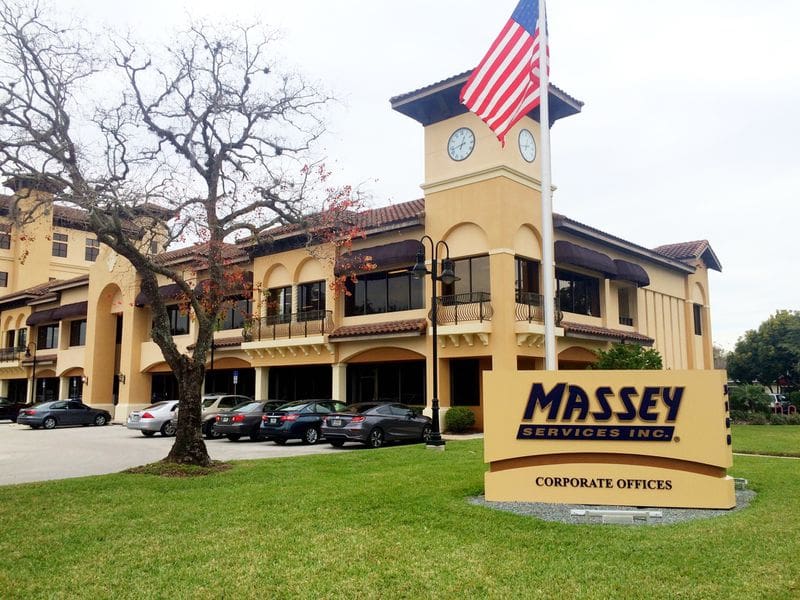
“Since those early days, our strategy has always been adding a physical location as soon as possible so that we can continue to emphasize productivity,” explains Adam Jones, the company’s vice president and director of quality assurance. “If we have to drive more than 20 minutes to provide a service, that’s too long.”
That’s why, early on, Massey took the existing North Orlando location and split it in half, also opening a South Orlando as a service center. Today there are 115 Florida locations, which allows Massey to respond quickly and efficiently to the needs of their customers.
“We have always focused our sales activities to sell our services to the neighbors of our existing customer base which reduced drive time and maximized the time we spend serving customers,” Jones says.
The company has also expanded in Georgia, Louisiana, North Carolina, Oklahoma, South Carolina, and Texas.
“We are constantly looking at minimizing drive time,” Jones says. “We typically have one team member in a truck but when you consider a landscaping crew of four people in a vehicle, that’s not just one-man hour of driving. In that situation, a 20-minute drive is really an 80-minute drive.”
The company gives intense focus to organizing work in such a way that minimizes travel time between stops in order to maximize service productivity. But Jones says that there are other benefits to growing with multiple locations that are smaller and more manageable.
“When you keep your span of control narrow, and your service centers relatively small, they are just a lot easier to manage,” Jones explains. “Growth happens around each physical location a lot more aggressively and your productivity improves. But it’s not overwhelming for each service center to stay on top of the customers’ and the team members’ needs.”
Massey has also maintained great control throughout their growth by “systematizing everything,” Jones says.
“We joke that there are three ways of doing things here — the Massey Way, the Massey Way, or the Massey Way,” Jones says. “We’ve found ways that are proven to work so we stick with them. In my role in quality assurance, I often find that when something goes wrong, it was because standard operating procedures weren’t followed.”
Jones says that his best leveling-up advice would be to write down your policies and procedures before you grow. When you do, you can replicate what you know works.
Leveling Up the Franchise Way: Lots to Learn from the Franchising System
Weed Man is a 50-year brand in the making and has a growth story from which plenty of lessons can be gleaned.
Jennifer Lemcke, CEO of Weed Man says that being “laser-focused” on franchisees’ success has been the reason behind their growth. Her family first started as franchise owners in Canada, then ultimately became the franchisor. But since 2018, they’ve taken over the worldwide brand. Lemcke says that they want every decision they make to help grow the bottom line for their individual franchisees.
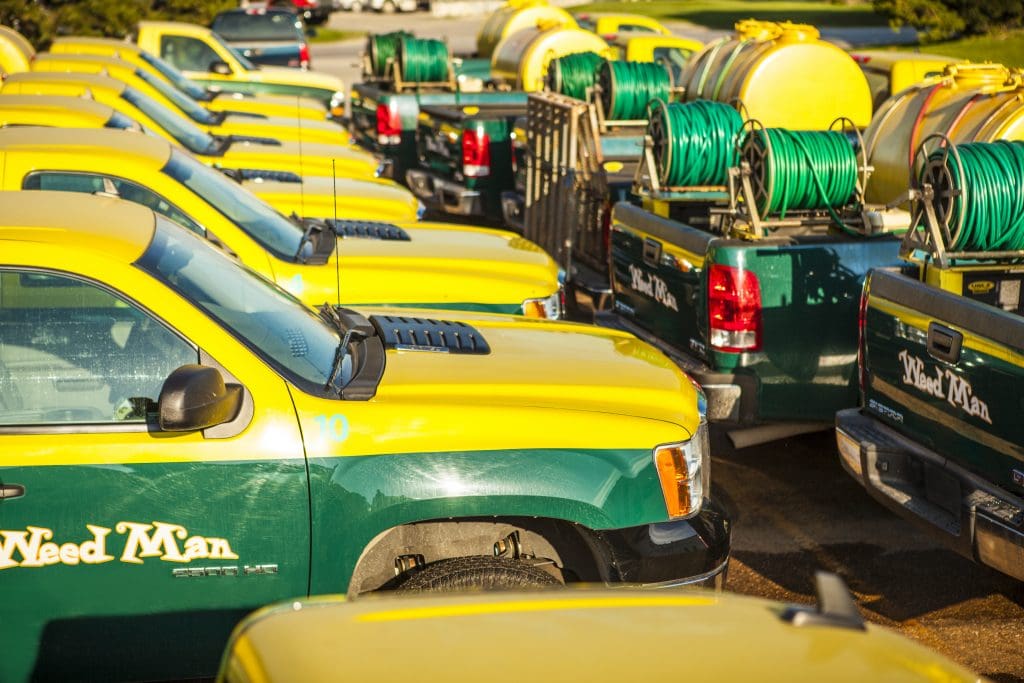
“To do that, we’ve had to measure everything and use the metrics to fill in any gaps,” Lemcke explains. “If there were problems, we were identifying them quickly and implementing solutions.”
But so often, lawn and landscape business owners operate without a strong understanding of where their company stands. Lemcke says that those who want to “level up” would benefit from starting to measure all potential data points within the company — from leads to sales to performance. Then, companies can make better-educated decisions to facilitate growth.
Lemcke says the other growth message out of the Weed Man story is the benefit of having systems and processes. Once you figure out what works, define it and replicate it. From her viewpoint, she has the advantage of a big picture view of all the Weed Man franchises. When it comes to hiring, Lemcke can see what strategies have worked for locations that are successful — and then share that information with others.
But for the independent business owner, there is much to be learned by looking internally at data, particularly if you have more than one location.
Lemcke adds that for landscaping companies looking to grow into the lawn care service, the franchise path might make a lot of sense. A lot of landscapers already sub this work out — so keeping it in-house can have its benefits.
“The benefit of growing by adding a franchise is that it will get you there faster,” Lemcke says. “While you can diversify on your own, a strong franchise should already have all of the systems and processes in place — plus the brand recognition — that can ensure you start making money on these new services quickly.”
If companies aren’t growing and expanding, Lemcke warns that the stagnation may not only hurt the bottom line but could mean hitting a brick wall with employees.
“If you aren’t growing and creating new opportunities for your people, your A players are going to start to look elsewhere,” she says. “We also tell our franchisees this same thing. If you hit a point where you’re really successful, you still have to keep going, or you’re going to lose the interest of your top players. That’s the point where you might add another franchise and let the top player run it. Success shouldn’t mean becoming complacent. You should always be looking at new ways to grow.”
Leveling Up Sales: Bringing in New Contracts
For Yellowstone Landscape, headquartered in Bunnell, Florida, with branches across the country, the most successful and organic growth has come from a focus on new contractual sales. Joseph Barnes, marketing director for the company says that the company’s dedicated sales team is critical to this success.
Yellowstone has a sales model that is focused on recurring contractual sales. Meaning that the salesperson is responsible for establishing relationships with new clients, but the company’s account managers are responsible for executing the work for the client and will also help with any future enhancement sales from there. So, account managers price and propose any work outside of the contract, not the salesperson who initially sold the contractual work.
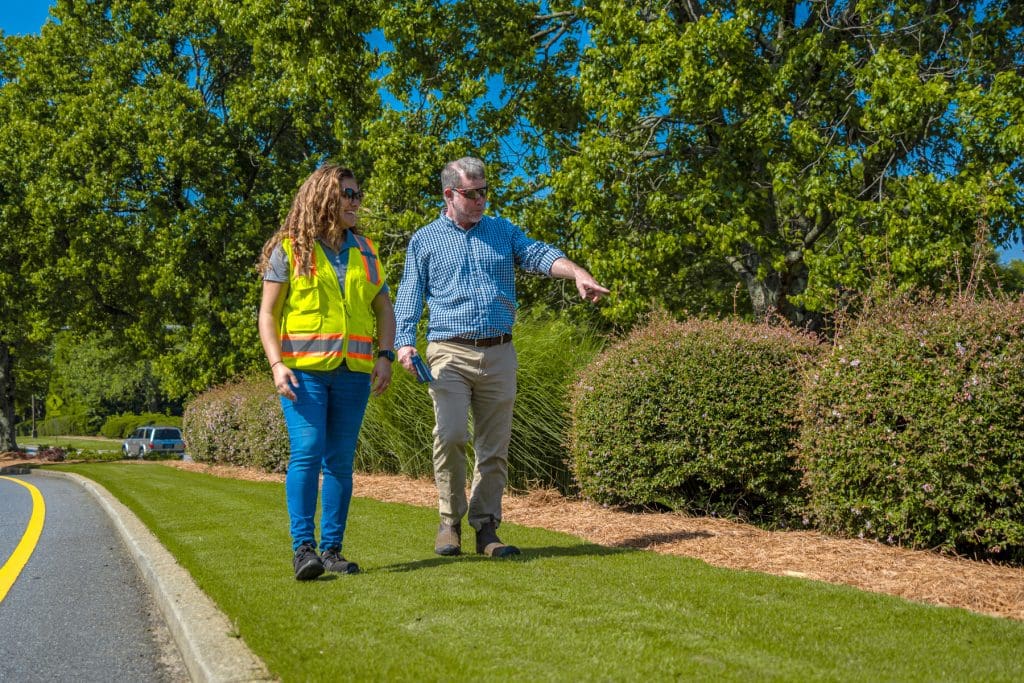
“This has made a huge difference in consistently bringing in new contractual work and making sure that our sales team isn’t the only point of contact for our clients,” Barnes says. “So often, we talk with other companies that view sales as a hybrid role. The account manager is responsible for both new sales and taking care of existing clients. But when that happens, new sales never get the attention it deserves. Account managers always have to put caring for the existing client first, which is absolutely what they should be focused on.”
Barnes says that a good salesperson will always pay for themselves. If they’re good enough, they’ll bring in the new work, Barnes says.
“A good salesperson also doesn’t need a huge salary — just a compensation structure that if they sell really good work for you, they’ll get a fair share that will motivate them to keep going,” he says.
In terms of who makes the best salespeople, Barnes says they take a different approach from many other landscaping companies in that they prefer not to hire from outside of the industry for sales.
“So often landscaping companies hire their salespeople from HVAC, plumbing, or waste management companies,” Barnes says. “But landscaping sales is so different from these other industries. The fact is the best salesperson for your company is probably already working for you.”
Barnes says that they have found some of the most success with employees that were already in the company in an operations role. These employees already understand landscaping — and they understand the clients’ needs. That is a winning combination for growth.
“We have found that the people who are really good at caring for our customers end up being the highest performing salespeople,” Barnes adds. “They know how to talk to customers and end up being the best evangelists for our company and our brand because they know us so well already.”
Barnes says that Yellowstone has seen tremendous growth over the past few years and the lion’s share of that has been brand-new contractual sales. While the company has certainly grown in various ways over the years including acquisitions, diversification of services, and adding new branches, Barnes says the main reason they’ve been able to level up and grow as big as they’ve grown has been their sales structure — and it’s the best lesson they can offer other companies.
“In our experience, if growth is your goal, sales can never be an afterthought,” he says.
This article was published in the November/December issue of the magazine. To read more stories from The Landscape Professional magazine, click here to subscribe to the digital edition.

